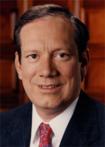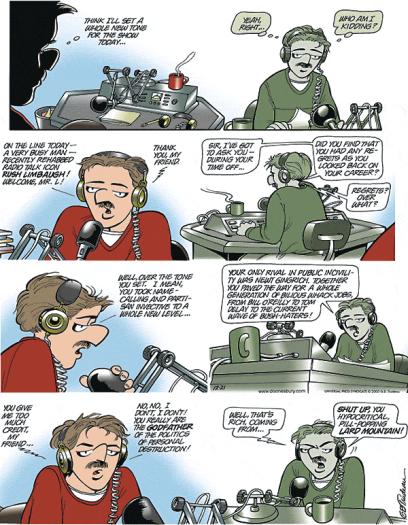Where are we going? Public discourse is coarse. The public discourse of street guys like those on The Sopranos is basically one obscenity and profanity after another. Why should we pretend that people don't speak this way in real life? They do. W has uttered an f-word threat to Al Hunt for an unfavorable Wall Street Journal editorial (in front of Hunt's wife and children). W referred to a NYTimes reporter as a major-league a**-hole while he was unaware of a nearby live microphone. If this be (fair & balanced) hypocrisy, so be it.
[x Washington Post]
Oh, R-o-ob, The Bad Words Won't Go Away
By John T. McWhorter
I am currently making my way through the new DVD set of the first season of "The Dick Van Dyke Show." In an episode that aired in 1962, Rob and Laura Petrie are horrified that their son has picked up a "dirty word." The viewer does not learn the word itself; Laura only whispers it into the phone, her hand cupped over her mouth, and she and Rob are incensed that their son has been exposed to "evil."
This was certainly a sanitized version of the linguistic reality of the day. But the distortion itself reflects an America that is anthropologically fascinating from our perspective in 2003 . A TV mom whispering a mild curse word into the phone rather than just saying it out loud is hopelessly implausible today, and getting ever more so.
This has never been more clear than it became a couple of weeks ago, when flavor-of-the-month Nicole Richie, appearing on Fox TV's "Billboard Music Awards" broadcast, casually dropped some classic four- (and more) letter words into her reminiscences of her stint on the reality show "The Simple Life." Fox's switchboard lit up with indignant callers, but the network received not even a slap on the wrist from the Federal Communications Commission, the agency that watchdogs on-air language. That's because two months before, unbeknown to many of us, the FCC had decreed a new era in American public language usage.
After receiving complaints that Irish rocker Bono had crowed, "This is really, really f -- -- ing brilliant!"on the "Golden Globe Awards" broadcast last January, also on Fox , the FCC's enforcement bureau ruled Oct. 3 that this adjectival usage of the F-word does not qualify as "patently offensive as measured by contemporary community standards for the broadcast medium." Predictably, this has not gone down well with some, from the Parents Television Council (which organized most of the Bono complaints) to congressmen to FCC Chairman Michael Powell himself, who played no part in the ruling and deemed it "reprehensible" that children might hear the F-word in any form on the air. But like it or not, we'd better get used to it. We are today a society that elevates giving the finger to "the man" to a sign of enlightenment. So there are bound to be more such rulings, and at the end of the day, we are best advised to fasten our seat belts and accept them.
We obsess over the encroachment of vulgar words into public spaces on pain of a stark inconsistency, one that will appear even more ridiculous to future generations than some Victorians calling trousers "nether garments" does to us. At least the Victorians' vocabulary taboos reflected mores that permeated society. Theirs was a world in which an author of a slang dictionary would have had trouble finding a publisher, people sequestered themselves under reams of fabric, illegitimate birth was a scandal, and sex was never spoken of in "polite society." Even as late as the Camelot era, Rob and Laura slept in twin beds and never went to the bathroom.
However we judge all this, it at least comprised a coherent worldview, of the sort that anthropologists deem a hallmark of human social organization. For generations, people were openly uptight about "those things" across the board. But we no longer are. And thus, banning the f-adjective in 2003 becomes a random, isolated gesture, displaying a studied daintiness that can only be defended with stammering vaguenesses.
Our America was just on the horizon when that Dick van Dyke episode I described aired. A few years later, the counterculture movement began. It arose as a rejection of the Vietnam War, segregation and political censorship, but soon broadened into an embrace of more visceral facets of the anti-establishment ideology: an embrace of the spontaneous, the "authentic," the "real." Naturally this included forms of speech once banned from public discourse.
Some of this was merely common speech itself. In 1848, everyday language was so rare on the stage that when the actor Frank Chanfrau ventured Bowery Boy street speech with the line "I ain't a-goin' to run wild wid dat mercheen no more," working-class Irish audiences in New York stopped the show with riotous applause for several minutes. But in the 1960s, this public airing of casual talk became ordinary. Students at Berkeley followed up the political Free Speech movement of 1964 with a "Filthy Speech movement" the next year, featuring placards emblazoned with the F-word. Over the next 20 years, "damn" and "hell" became typical on stage and screen.
Few of us mind this today. We giggle at the stir over Clark Gable's Rhett Butler saying -- horrors! -- "I don't give a "damn" in the 1939 movie "Gone With the Wind." We see Puritanism in the Motion Picture Production Code banning the winkiness of Mae West's routines and sanitizing cartoon flapper Betty Boop into a high-collared hausfrau. And we see as a moral victory the recent posthumous pardoning of comedian Lenny Bruce, who was convicted in the 1960s for using obscenities in his nightclub act.
How overwrought, of course. But if we view as antique the Catholic matrons who banned the "authenticity" we now cherish in pre-Production Code movies, then where do we draw the line in terms of what we decree as inappropriate nowadays?
The Communications Act of 1934, which established the FCC, stipulated such a line. This law, penned by people born in Victorian America, decreed to be publicly inappropriate language that "describes or depicts sexual or excretory activities or organs." But this only leads to a question: If we are now so comfortable acknowledging, discussing and even displaying our most private "parts" in public, then precisely what is the logical justification for refraining from using words that connote what we do with them?
After all, this is an America where the actress Téa Leoni purrs in TV Guide about having "mated often" with an ex-lover, academics celebrate the profanity in rap music as visionary, sensitive adults are warmly fascinated by Eminem, R-rated movies are common coin among teenagers, unmarried celebrity couples casually announce the expectation of babies, young men show their underwear above their belts, and young women in "low-rider" jeans display a netherly fissure celebrated in some places as "the new cleavage."
In this context, to resist using a particular vulgarity on television stands not as a conviction inherent to our national fabric, but as an emotional sentiment brandished by a minority. Rob and Laura's quaintness in our eyes reveals that the counterculture has become our warp and woof. We seek as narrow a gulf as possible between public show and private reality. To us, the sentiment Bono expressed with his "f -- -- ing brilliant" channels an individuality, humility and even warmth that no formal translation such as "truly amazing" could. It channels exactly the "get real" essence that makes it seem odd to us that when Laura is carrying Richie she must be referred to as "expecting" because of a sense that "pregnant" is too vulgar.
I should say, however, that though I never knew Rob and Laura's America, I am no more immune to visceral responses to profanity than anyone else. Long ago a woman with whom I had a dinner date casually let fly with a term for what Victorians might have referred to as the female pudendum. Even I had a gut-level sense that this was "a bit much."
But gut-level was all it was, and "a bit much" does not suffice as a basis for coherent public policy. After all, the producers of Dick Van Dyke got angry mail from viewers who thought the snug capri pants Mary Tyler Moore wore on the show were "a bit much." We chuckle now. But on what basis can we casually accept seeing ever more of the human bodies that horrified the ladies of the Junior League in 1962 and yet insist on "drawing a line" at words that connote activities connected with those bodies? If we affectionately give our children books such as "Our Bodies, Ourselves," celebrating the joys of sex, how can we defend decrying Bono's jolly exclamation for hinting that, well, people have sex?
Surely we fear the slippery slope. I certainly itch at the notion of sitcom characters using the word my date used. But public norms never leap far ahead of the majority's primal sense of propriety. I suspect that most of us, if we saw Kelsey Grammer's Frasier let out with "That's f -- -- amazing," would celebrate the character's "loosening up" a bit. The word has gotten as far as it has because it is now common enough in casual speech to qualify for most as more colorful than truly profane. It is questionable that it even connotes the sexual anymore. This is typical of how words evolve through time. Technically, for instance, "ice cream" means cream rendered through ice, or "iced cream," but few of us process it consciously that way -- in casual speech it is now a single word, "ayeskream." The f-adjective is now one of many intensifiers in English, like "extremely," with a flavor surely pungent but barely sexual. In that light, the FCC's decision was not mere hair-splitting, but linguistically honest, and reflects our "contemporary community standards."
Thus we are witnessing less a linguistic free-for-all than a narrowing of the gap between the formal and the informal in public discourse. Because advertisers are loath to offend any significant number of their potential customers, the few words we now process as truly beyond the pale will likely only hit the tube after having lost much of their sting through constant use.
The days when even mild epithets were never uttered in public language are gone for good. The exoticness of Rob and Laura's world to us demonstrates that we have transformed ourselves beyond it forever. As far as language on television goes, unless we shed our affection for "getting real" -- and there are no indications that we will -- we can only hold on to our hats.
But then we don't really wear hats anymore -- and that's the point. Just like clothing, our language reflects who we are, and we are a people who can only deem most profanity "evil" if we are ready to be seen 50 years from now as being as laughable as the producers of "Gilligan's Island" who required Mary Ann to keep her navel covered.
John McWhorter is a senior fellow at the Manhattan Institute and author of Doing Our Own Thing: The Degradation of Language and Music and Why We Should, Like, Care (Gotham Books).
© 2003 The Washington Post Company



